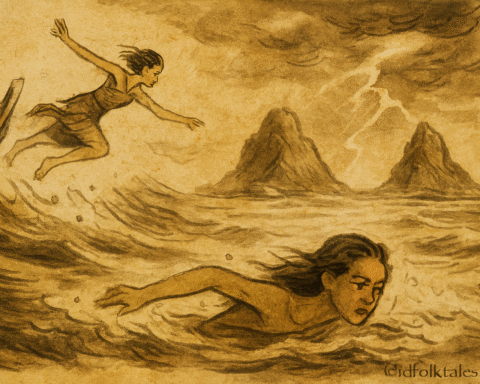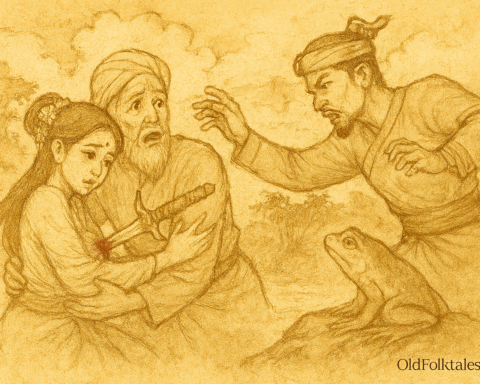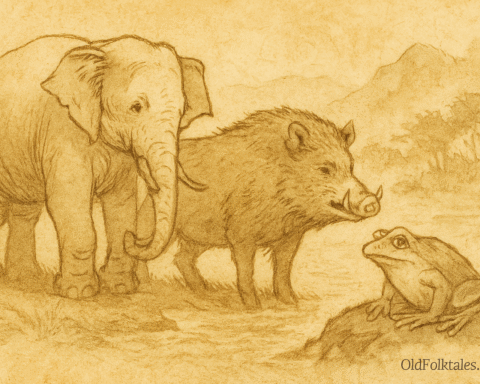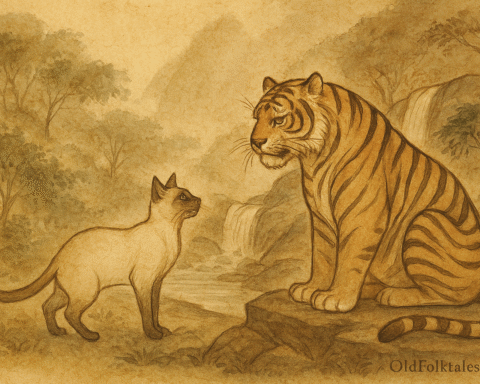High atop Gunung Ledang, a mystical mountain that rises majestically near the bustling port city of Malacca, there lived a princess unlike any other. Puteri Gunung Ledang was no ordinary woman, she was a fairy princess blessed with supernatural powers and beauty so radiant that even the morning mist seemed to bow in her presence. Her mountain sanctuary was a realm of clouds and cool breezes, far removed from the politics and ambitions of mortal men below.
But tales of extraordinary beauty have a way of traveling, carried on merchant ships and whispered in palace corridors. Eventually, word of the princess reached the ears of the Sultan of Malacca himself, one of the most powerful rulers in the Malay Archipelago. His kingdom commanded respect across the seas, his wealth was legendary, and his word was law. The Sultan was accustomed to having whatever he desired, and upon hearing descriptions of the mountain princess, he became consumed with the idea of making her his bride.
Like any sultan who sees something he wants, he did not pause to consider whether his affections might be unwelcome. Instead, he immediately summoned his most trusted warrior, the legendary Hang Tuah, along with his companions. These brave men had fought countless battles for their lord, defended the kingdom from invaders, and completed impossible missions. Now they faced perhaps their strangest assignment yet: to climb the sacred mountain and convince a mystical princess to marry their Sultan.
The journey up Gunung Ledang was treacherous. Thick jungle vegetation gave way to rocky paths shrouded in perpetual mist. When Hang Tuah and his men finally reached the princess’s dwelling, they found her sitting serenely amidst the clouds, her beauty even more breathtaking than the tales suggested. With deep respect, they delivered the Sultan’s message, praising his greatness, his power, and his earnest desire to make her his queen.
The princess listened with an inscrutable expression. She could have simply refused after all, what power did a mortal sultan hold over a fairy princess in her mountain realm? But Puteri Gunung Ledang was as clever as she was beautiful. She understood that a direct rejection might wound the Sultan’s pride and bring unwelcome consequences to her peaceful existence. So instead, she smiled mysteriously and said she would consider the proposal.
However, she continued, before she could possibly agree, the Sultan would need to prove the depth of his love by fulfilling seven conditions. Seven gifts that would demonstrate his worthiness to marry someone of her celestial nature.
Hang Tuah, relieved to not receive an outright refusal, eagerly asked what these conditions might be. The princess’s smile deepened as she listed them:
First, the Sultan must construct a golden bridge stretching from Malacca all the way to her mountain, a walkway worthy of a princess who would descend to the mortal realm.
Second, he must build a silver bridge from her mountain back to Malacca, because surely a future queen should never walk on anything less precious than gold and silver.
Third, he must present her with seven trays filled with the hearts of mosquitoes, those tiny, persistent creatures that plagued all living beings.
Fourth, seven trays filled with the hearts of germs, even more impossible to collect than mosquito hearts.
Fifth, seven barrels of young betel nut juice, in which she might bathe to maintain her ethereal beauty.
Sixth, seven barrels containing the tears of virgins, also for bathing in the tropical heat of the lowlands.
And finally, seventh, a silver cup filled with blood drawn from the Sultan’s own son.
Hang Tuah returned to the palace with this list, his heart heavy with foreboding. But the Sultan, blinded by obsession and confidence in his unlimited resources, immediately set about attempting to fulfill these demands. He mobilized his entire kingdom. Craftsmen were commissioned for the bridges, though the sheer quantity of gold and silver required would bankrupt the royal treasury. Scholars and wise men puzzled over how to capture mosquito hearts and germ hearts, tasks that seemed to mock the very laws of nature.
The Sultan’s obsession consumed him. He poured the kingdom’s wealth into these impossible tasks, achieving what he could while his advisors watched in dismay. His people suffered as resources were diverted to satisfy one man’s desire. Month after month, the Sultan drove himself and his kingdom toward ruin, accomplishing the seemingly impossible through sheer, stubborn determination.
Six of the seven demands were met, or so he convinced himself. The bridges gleamed in the sun, the barrels were filled, the trays arranged. But when he finally confronted the seventh demand, reality crashed down upon him like a collapsing mountain. The blood of his son. His only child. His heir. The boy who would carry his legacy forward.
Even through his obsession, the Sultan could not bring himself to harm his own son. With that realization, the spell broke. He finally understood what his advisors and even Hang Tuah had known from the beginning—that Puteri Gunung Ledang had never intended to marry him. Her impossible demands were not tests of love but elegant rejections wrapped in the guise of conditions. She had given him a way to save face while protecting her freedom.
But the Sultan had been too proud to see it, too confident in his ability to possess whatever he wanted. His arrogance had cost his kingdom dearly. The bridges were never completed, the treasures spent in vain. The princess remained on her mountain, untouched and unmoved, while below, the Sultan surveyed the ruins of his obsession.
Journey through enchanted forests and islands in our Southeast Asian Folktales collection.
The Moral
True wisdom lies in recognizing when desire leads to destruction. Some things and some people cannot and should not be possessed, regardless of one’s power or wealth. Pride and obsession blind us to simple truths, and the refusal to accept “no” for an answer, even when elegantly delivered, leads only to ruin. The greatest strength sometimes lies in knowing when to let go.
Knowledge Check
Q1: Who was Puteri Gunung Ledang and where did she live?
A: Puteri Gunung Ledang was a fairy princess with mystical powers and extraordinary beauty who lived on Gunung Ledang (Mount Ledang), a mountain near Malacca in Malaysia. She was a supernatural being who resided above the mortal realm.
Q2: Why did the Sultan of Malacca want to marry the princess?
A: The Sultan became obsessed with marrying Puteri Gunung Ledang after hearing tales of her exceptional beauty. As a powerful ruler accustomed to obtaining whatever he desired, he believed he could win her hand in marriage and sent his warriors to propose on his behalf.
Q3: What were the seven impossible demands made by the princess?
A: The princess demanded: (1) a golden bridge from Malacca to her mountain, (2) a silver bridge from her mountain to Malacca, (3) seven trays of mosquito hearts, (4) seven trays of germ hearts, (5) seven barrels of young betel nut juice, (6) seven barrels of virgin tears, and (7) a silver cup filled with blood from the Sultan’s own son.
Q4: Why couldn’t the Sultan fulfill all seven demands?
A: Although the Sultan attempted to fulfill all demands and claimed to accomplish six, he ultimately could not complete the seventh, providing blood from his own son. The Sultan could not bring himself to harm his only child and heir, which finally made him realize the futility of his quest.
Q5: What was the symbolic meaning behind the princess’s impossible demands?
A: The princess’s demands were intentionally impossible—a clever way to reject the Sultan’s proposal without directly refusing him. This approach allowed her to maintain her freedom while giving the Sultan an honorable way to withdraw his proposal without losing face completely.
Q6: What lesson does this Malaysian folktale teach about power and obsession?
A: The story teaches that wealth and power cannot force genuine affection or possession of another person. It warns against the dangers of obsession and pride, showing how the inability to accept rejection—even when elegantly delivered, can lead to the destruction of one’s kingdom and legacy.
Source:
Adapted from the Malaysian legend “Puteri Gunung Ledang” (Princess of Mount Ledang), a famous folktale from the Malacca Sultanate period (15th-16th century).
Cultural Origin: Malaysia (Malay folklore)






